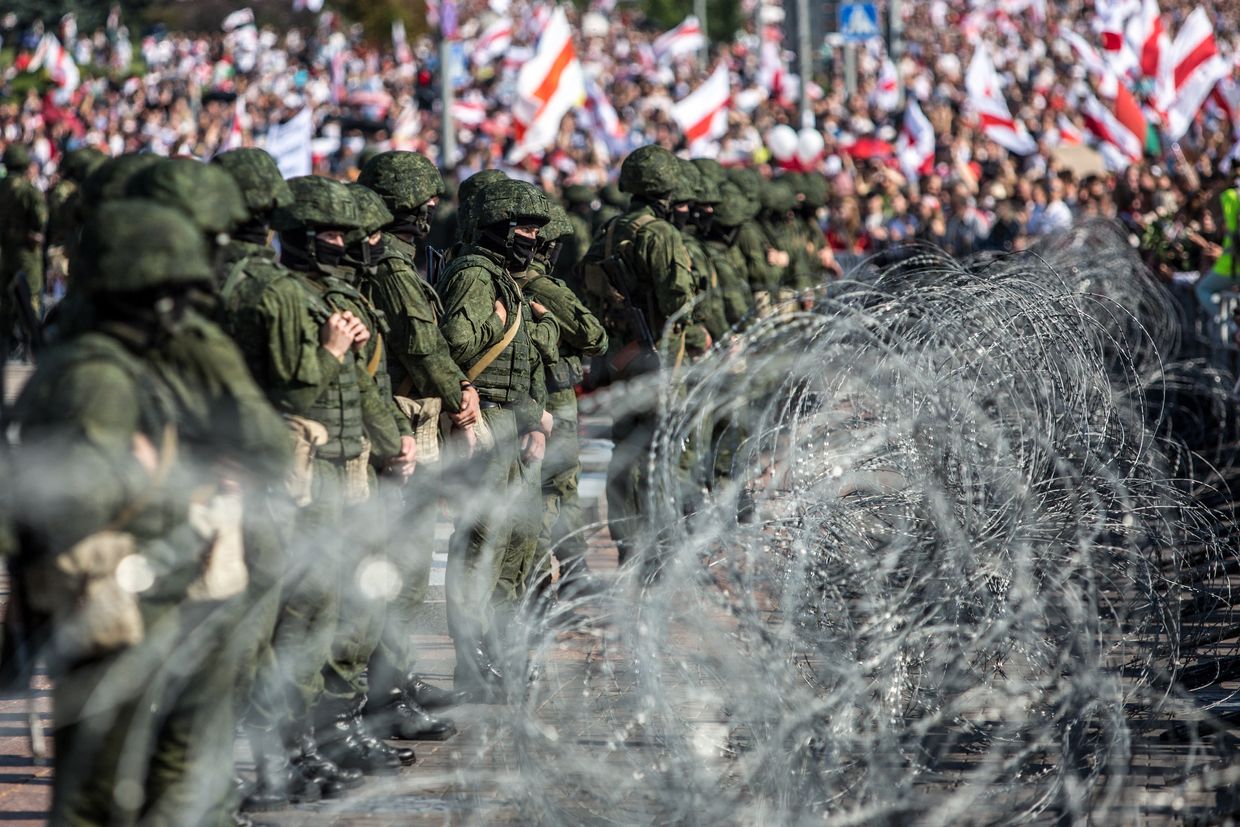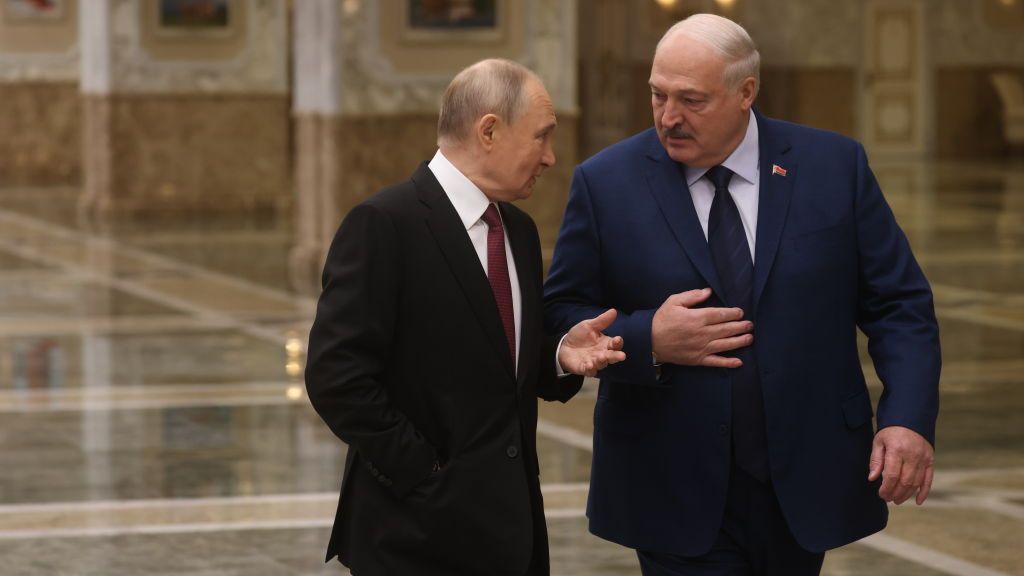The EU imposes new sanctions on Belarusian officials and companies supporting the regime of Alexander Lukashenko.
In response to Belarus and Russia’s artificial migration crisis, the EU pledged 170 million euros for border security and backed Poland’s plan to suspend the right to asylum.
Belarus labels exiled National Theater actors as an “extremist formation,” criminalizing interactions with them for Belarusians inside the country.
Minsk arrested seven ex-journalists of the closed newspaper as the pre-election crackdowns continued.
EU announces a 30 million euro aid program for Belarusian civil society in 2025.
EU introduces new sanctions against Belarusian officials, companies supporting Lukashenko regime
The Council of the European Union on Dec. 16 imposed a fresh set of sanctions against 26 individuals and two companies in Belarus.
According to the press release, the restrictions were introduced “in view of the situation in the country.” The new measures targeted members of the judiciary responsible for politically motivated persecution and the heads of penal facilities where political prisoners are held in “inhumane conditions.”
Belarus has nearly 1,300 political prisoners, who were sentenced in the aftermath of nationwide protests in the wake of the sham 2020 presidential election. At least 2,200 former political prisoners have since been released after serving their full term, while over 50,000 individuals have been subjected to arbitrary detentions throughout the past four years, according to Viasna Human Rights Center.
The list of sanctioned individuals also includes the business owners and board members of two companies that benefited from the regime of Belarusian dictator Alexander Lukashenko and were involved in sanctions circumvention.
The new restrictions impose an asset freeze on the transportation and storage company, Vlate Logistik LLC, which operated two privately owned customs checkpoints at the Belarus-EU border, and Ruzekspeditsiya LLC, which has been facilitating EU sanctions circumvention by exporting sanctioned fertilizers and taking delivery of cars prohibited for sale to Belarus, which are subsequently supplied to Russia.

Throughout his 30-year rule, Lukashenko has been repeatedly subjected to European sanctions due to his regime’s human rights abuse, disappearances of political opponents, and the instrumentalization of migration. Since 2022, the EU, the United States, and other Western states have introduced sectoral and financial sanctions over Minsk’s support for Russia’s war against Ukraine.
Altogether, the restrictions apply to 287 individuals and 39 entities in Belarus.
EU greenlights Poland’s plan to suspend right to asylum to counter ‘weaponization of migration,’ allocates 170 million euros for border protection
The European Commission has supported Poland’s controversial plan to temporarily suspend the right to asylum for illegal immigrants if they are believed to have been “weaponized” by Belarus and Russia.
The move allows Poland and other EU states to suspend the “fundamental rights” of migrants if it is suspected that Russia and Belarus organized their transport from their home countries to the EU’s border, and facilitated their crossing. To further enhance border surveillance, the European Union pledged 170 million euros ($179 million) of funding to Poland, Finland, Lithuania, Latvia, Estonia, and Norway.
The funds will go towards upgrading electronic surveillance equipment, deploying mobile detection and counter-drone equipment, and enhancing the mobility of border patrols.
Polish Prime Minister Donald Tusk announced on Oct. 15 the adoption of the contentious plan to temporarily suspend the right to asylum of the waves of irregular migrants from third countries gathering on the country’s eastern border and arriving via Belarus and Russia.
Brussels accuses Belarus and Russia of the “weaponization of migration,” describing it as “hybrid warfare” designed to “destabilize” European societies, according to the Communication to Support Member States adopted on Dec. 11.
Adopting the communication represents a change in the EU’s approach to a more conservative stance in its migration policy. Following an initial pushback and demands that Poland implement the provisions of the bloc’s migration pact, the EU’s executive branch accepted the possibility and outlined the conditions for the suspension of the right to asylum.
Despite a subsequent outcry from human rights organizations demanding that the right to asylum in Europe be upheld, the EU Commission decided that the suspension of fundamental rights is possible, although it has to be “proportionate, limited to what is strictly necessary in clearly defined cases, and temporary.”
Minsk began sending migrants to the EU’s borders in the summer of 2021, responding to European sanctions introduced over the human rights abuse after the rigged 2020 Belarusian presidential elections and the forced landing of a European commercial flight in Minsk. One of Lukashenko’s political opponents on board the plane was arrested, jailed, and has subsequently been used as a regime propaganda mouthpiece.
Following an initial abatement of the crisis in 2021, since 2023 the number of illegal arrivals has risen by 66%. Brussels believes Russia is facilitating the renewed hybrid attacks, as 90% of the migrants illegally crossing the Polish-Belarusian border have a Russian student or tourist visa.
Poland has stopped 26,000 illicit border crossing attempts in 2024 alone, according to the country’s Defense Ministry.
Continuous crossing attempts by migrants prompted Poland, Latvia, and Lithuania to build walls along their borders with Belarus.
Belarus designates former National Theater’s actors ‘extremist formation’
The Belarusian Internal Affairs Ministry has declared former actors of the Belarusian National Theater to be members of an “extremist formation,” Russian state-run news outlet Sputnik has reported.
Over 60 employees of Yanka Kupala National Academic Theater in Minsk resigned from the theater in protest following the rigged 2020 presidential elections, which Lukashenko claimed to have won by a landslide. In exile, the former actors launched a theater group called “Volnya Kupalaucy,” touring Europe and broadcasting their work on YouTube.
Belarus’s law enforcers accused the exiled theater group of allegedly “preparing to commit attacks on Belarus’s sovereignty” and “discrediting state officials.” They banned the group from the Belarusian segment of the Internet.
Participation in the group or “communicating information” to its representatives is now punishable with up to seven years of imprisonment, according to Belarusian law.
The group’s designation as an “extremist formation” serves as a confirmation that “Belarusian culture is a threat to the regime,” the former theater’s director and current opposition figure Pavel Latushka told independent Belarusian news outlet Pozirk.
In 2020, after the Culture Ministry fired Latushka from his position as a theater director for supporting the movement, sixty employees resigned, leaving the theater idle for nearly three months.
Lukashenko’s regime has frequently wielded its anti-extremism legislation against expressions of dissent. According to Viasna, at least 4,766 Belarusians are currently recognized as “extremists,” and countless media outlets and communities of Belarusians abroad have been slapped with the “extremist formation” label, criminalizing interactions with them for Belarusians within the country.

Belarusian authorities arrest 7 former journalists of closed independent newspaper
Belarusian authorities have arrested seven former journalists of the regional newspaper Intex Press, the Viasna Human Rights Center reported on Dec. 12.
The arrest of the journalists comes amid sweeping raids against opponents of the regime ahead of the January 2025 presidential elections. The first presidential vote since the contested 2020 race — which sent the country into a lasting political crisis — is set to extend Lukashenko’s three-decade rule of the country, which began when he was elected president in 1994.
The raids in the western city of Baranavichy targeted seven former employees of the Intex Press, the largest regional newspaper in Belarus. They were accused of “facilitating extremist activities.”
Charges of “extremism” are frequently brought against independent media in Belarus to obstruct their work, the independent Belarusian Association of Journalists (BAJ) notes in a statement on the arrests. It called for a halt to the “witch hunt” against journalists. The independent association, which defends media freedoms in Belarus, has also been given an “extremist” status by the Lukashenko regime.
The detentions in Baranavichy brought the total count of jailed journalists to 45, the BAJ reports.
“Journalists, even after the closure of their publications, continue to face threats and harassment, which hampers their work and creates a climate of fear,” said the Brest regional branch of Viasna.
Intex Press’s print run was terminated in 2021 following the publication of an interview with Sviatlana Tsikhanouskaya, who claimed to have beaten Lukashenko on the ballot in the 2020 presidential elections. Government-run firms refused to print and disseminate the newspaper. The Information Ministry terminated the newspaper’s license the following year.
The newspaper’s online publications were designated extremist in April 2023 and its website was blocked.
The international media freedom watchdog Reporters Without Borders ranked Belarus fourth among the world’s biggest journalist jailers in 2024, along with China, Myanmar, and Israel. The country ranks 167 out of 180 in the annual Press Freedom Index, having dropped ten places since 2023.

EU allocates 30 million euros for Belarusian civil society in 2025
The European Commission has announced 30 million euros ($31.5 million) in funding for Belarusian civil society in 2025.
The EU Commissioner for Enlargement, Marta Kos, announced the funding during a meeting with Belarusian opposition leader Sviatlana Tsikhanouskaya on Dec. 12. The EU4People of Belarus program will support independent media and civil society actors advocating for democracy in Belarus, and support education, culture, and small and medium enterprises in exile.
The announcement coincided with the holding in Brussels of Belarus Days – a series of events held between Dec. 9-13. Organized by the European External Action Service, European Commission, and European Parliament, the events brought together 150 Belarusian activists with European officials ahead of the 2025 presidential elections in Belarus in which no independent candidates were allowed to participate.
In meetings with European Parliament President Roberta Metsola and EU High Representative Kaja Kallas, Tsikhanouskaya emphasized that the upcoming elections were a “sham.” She advocated the non-recognition of its results by EU member states, and pressuring the Lukashenko regime with more sanctions.
Discussions also included the topic of regional security with EU Commissioner for Defense Andrius Kubilius. In addition, Minister-President of Flanders Matthias Diependaele promised an additional 100,000 euros to be allocated for media support.
Since the widely disputed 2020 elections, the European Union has mobilized 170 million ($179 million) euros in support for the Belarusian people and pledged 3 billion euros in economic aid, contingent on a democratic transition in the country.















